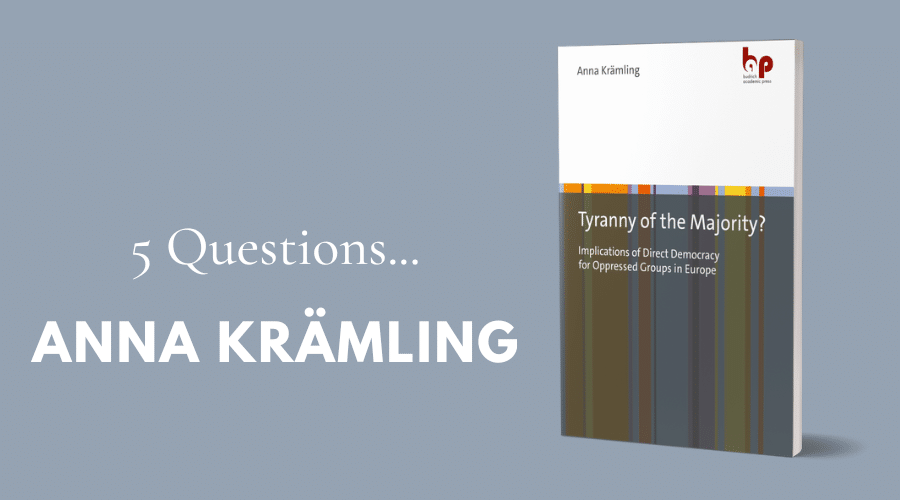We conducted an interview with author Anna Krämling about her new book “Tyranny of the Majority? Implications of Direct Democracy for Oppressed Groups in Europe”. Anna Krämling’s analysis of over 500 referenda shows that Oppressed Groups were often able to benefit from direct democracy.
Interview on
“Tyranny of the Majority? Implications of Direct Democracy for Oppressed Groups in Europe”
Dear Anna Krämling, what questions are you addressing in your publication “Tyranny of the Majority? Implications of Direct Democracy for Oppressed Groups in Europe”?
I address mainly three questions on the record of oppressed groups in direct democratic votes in European democracies in the recent past. First, I analyze whether direct democratic bills and outputs support or disadvantage the interests of oppressed groups. Second, I address the question what explains whether supportive rather than disadvantaging bills come to a vote, and what explains supportive and disadvantaging outputs, respectively. Finally, I analyze whether we can observe differences in bills and outputs depending on which oppressed group is affected by the vote, and, based on this, what constitutes the concept of oppressed groups in direct democracy.
You analyse 500 referenda in European democracies for your work. How did the idea for this publication come about?
After finishing my Master in Political Science, I started working on a project funded by the German Research Foundation (DFG) and led by Brigitte Geißel on “Inequality and direct democracy in Europe”. In this project, we started collecting data on all national-level direct democratic votes in European democracies between 1990 and 2015. While the focus of the project was perhaps more broadly on the impacts of these votes on different dimensions of equality, the finding that research was rare on the important topic of direct democratic implications on minorities soon sparked my interest. At the same time, AfD was campaigning to extend direct democratic options to the federal level in Germany. Therefore, I wanted to investigate the fate of oppressed groups in these votes in more depth, to explore further the risks and opportunities of direct democracy in this regard.
Democracies worldwide are increasingly under pressure. What advantages of direct democracy do you see?
Direct democratic votes can grant people whose voices are often overheard in the public debate and whose interests are rarely represented in representative institutions opportunities to bring their topics on the public agenda and campaign for their interests. My analyses revealed that for a wide variety of oppressed groups, bills that came to a direct democratic vote as well as bills that were adopted in these votes more often supported the interests of the groups than disadvantaged them.
What disadvantages?
Sometimes, direct democratic votes reinforce inequalities already known from representative institutions. My results revealed that, whereas even groups with low socio-economic status could benefit from direct democratic votes, other groups were put at a disadvantage more often – namely, members of the LGBTQ+ community, people without the citizenship of the country they live in, and politically disadvantaged groups. Resources, rights and the attitudes of the citizenry at the time of a vote seem to be decisive for a groups’ success or failure in direct democracy. Therefore, vulnerable groups need support and protection in these votes.
In your book, you develop impulses for how direct democracy could be structured to protect oppressed groups. Could you summarize the results in three sentences?
In order to protect oppressed groups, judicial review of direct democratic bills and the exclusion of topics endangering fundamental rights are important. Groups that proved to be disadvantaged in these votes should be supported to help them succeed at the ballot, i.e. by granting institutional support for the often complex steps necessary to bring a topic to a vote. Finally, my multivariate analyses suggested that votes where the vote result is binding and those where no threshold has to be fulfilled in order for the bill to be adopted seem to be more likely to produce outputs supportive of oppressed groups and less likely to produce outputs disadvantaging them.
 About Anna Krämling
About Anna Krämling
Anna Krämling worked as a research and teaching fellow at the Research Unit “Democratic Innovations” at Goethe University Frankfurt from 2017 until 2023. She was a Democracy Visiting Fellow at the Ash Center for Democratic Governance and Innovation at Harvard Kennedy School in 2021 and 2022. After finishing her PhD on direct democracy’s implications for oppressed groups at Goethe University, she now works as a public servant for the State of Hesse.
Order this book in our webshop

Anna Krämling
“Tyranny of the Majority? Implications of Direct Democracy for Oppressed Groups in Europe”
Available as print and e-book.

